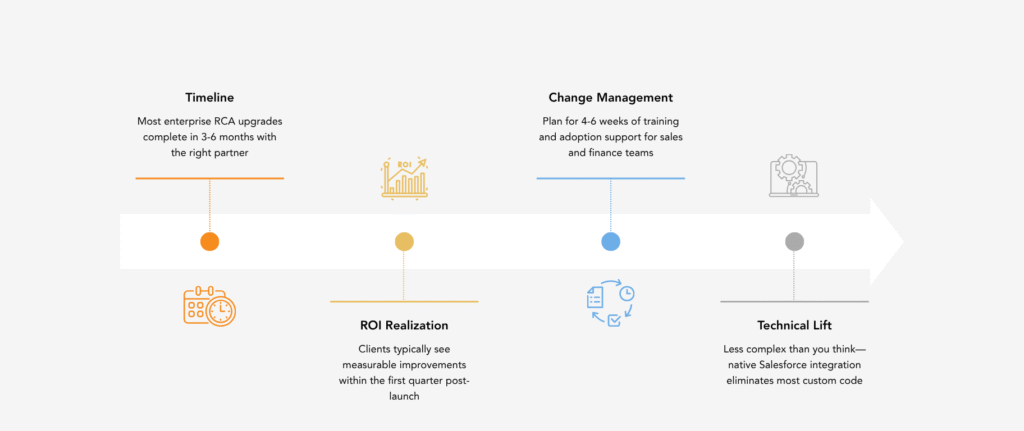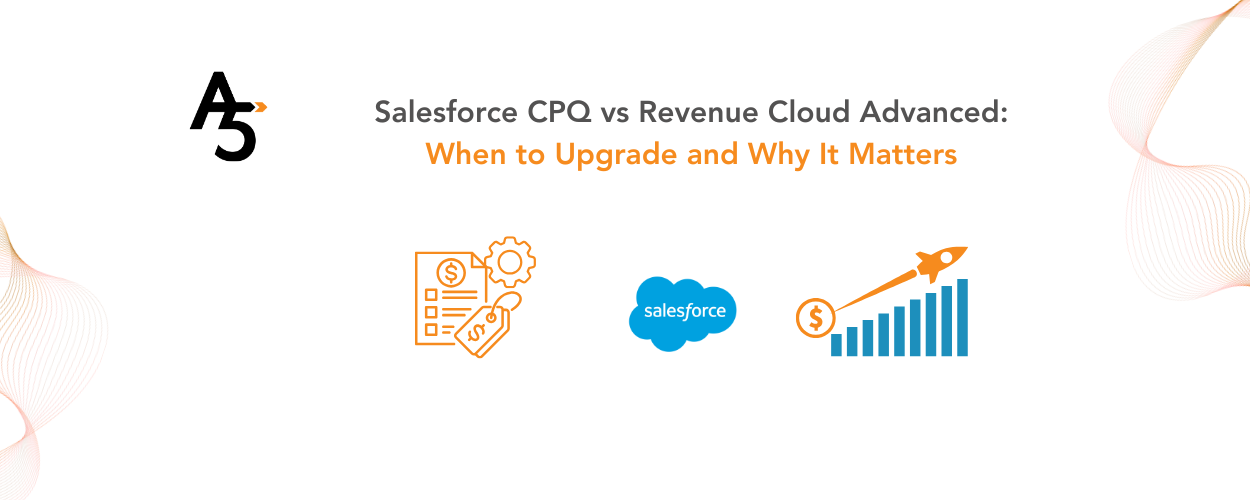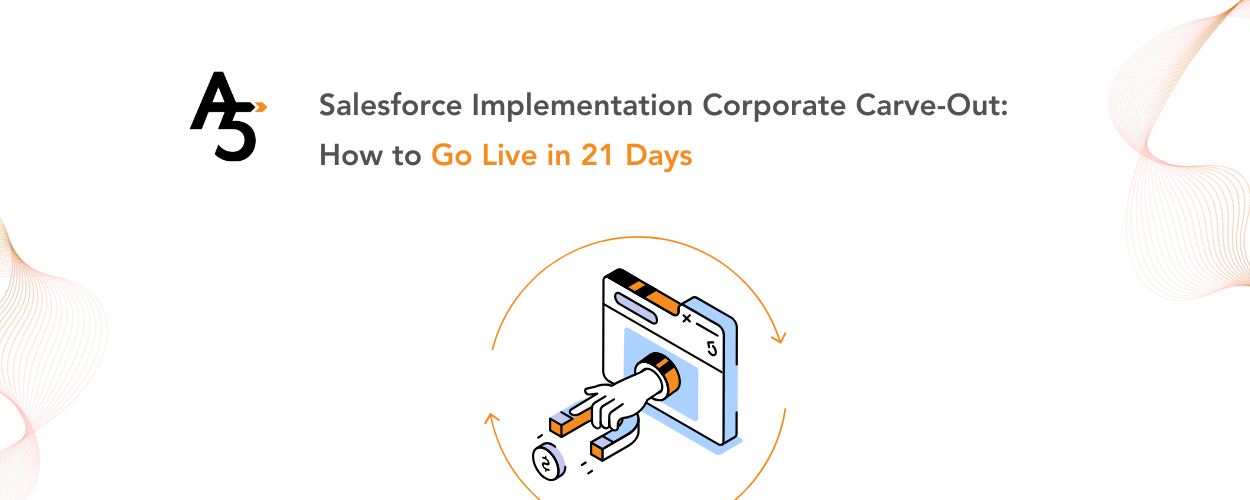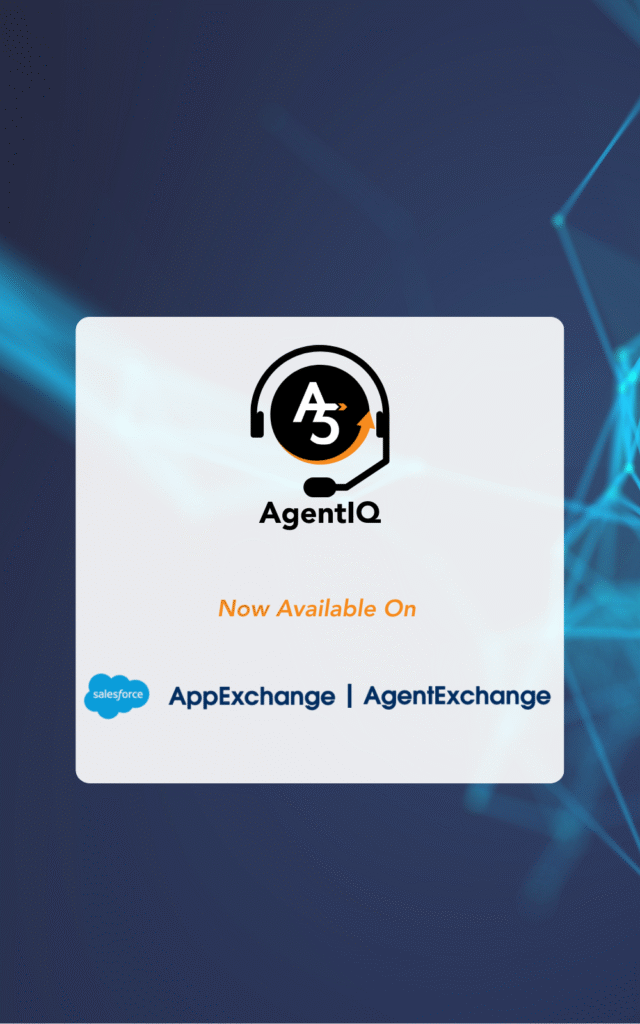Let’s talk about something that’s been coming up in almost every boardroom and admin community we engage with: the Salesforce CPQ to RCA (Revenue Cloud Advanced) upgrade decision. This isn’t about chasing the latest Salesforce release. It’s about recognizing when your revenue operations have outgrown the tools that got you here. And for many enterprises planning their upgrade from Salesforce CPQ to Revenue Cloud Advanced right now, that moment has arrived.
TL;DR: Why This Matters for Your Enterprise
Salesforce CPQ to RCA upgrade isn’t just a technology refresh — it’s a fundamental shift in how enterprises manage quote-to-cash operations. If you’re dealing with fragmented systems, manual approvals, or can’t get real-time revenue visibility, it’s time to evaluate Salesforce RCA.
Key Facts:
✓ 78% of companies using modern CPQ reduced quote turnaround by 50%+ (Market Growth Reports, 2024)
✓81% of new CPQ deployments will be cloud-based by 2026
✓ RCA delivers native integration across quoting, billing, and revenue recognition — eliminating custom code
✓According to Salesforce benchmarks and A5’s enterprise RCA implementations, organizations typically see 30–40% faster quote cycles and a 30% improvement in forecast accuracy post-migration.
Who Should Read This:
CIOs evaluating platform strategy, CROs seeking revenue operations efficiency, CFOs needing real-time financial visibility, and Salesforce admins influencing the upgrade decision.
Why Revenue Operations Leaders Are Evaluating Salesforce RCA in 2025
Here’s what we’re seeing across our global client base: companies that thrived with Salesforce CPQ five years ago are now wrestling with processes that feel increasingly fragmented. Sales teams are working on one system, finance is in another, and nobody has a real-time view of what’s actually happening with revenue. Sound familiar? The conversation around Salesforce CPQ to RCA upgrade isn’t really about features. It’s about whether your quote-to-cash process is accelerating your business or quietly holding it back.
How Salesforce CPQ and Revenue Cloud Advanced Differ: A Strategic Comparison
Salesforce CPQ was groundbreaking when it was launched. It brought structure to quoting, helped sales teams configure complex products, and eliminated a lot of spreadsheet chaos. For its time, it was exactly what enterprises needed.
But the revenue landscape has fundamentally shifted:

This is where Salesforce Revenue Cloud Advanced enters the picture — not as an incremental upgrade, but as a fundamental rethinking of how revenue operations should work.
Revenue Cloud Advanced Benefits: What Modern Enterprises Gain
Revenue Cloud Advanced was purpose-built for the complexity modern enterprises of today actually face. Here’s what that means in practice:
Unified Quote-to-Cash Integration Across Systems
RCA unifies quoting, billing, revenue recognition, and analytics on a single intelligent platform. Not through integrations — natively. Your sales team creates a quote, it flows directly into billing, finance sees it in real-time, and everyone’s working from the same data.
One of our clients, a global technology company, described the difference perfectly: “We went from reconciling three systems at the end of every quarter to having one version of truth that updates continuously.”
AI-Powered Revenue Automation and Intelligent Pricing
The automation in RCA goes beyond basic rules. We’re talking about AI-driven pricing recommendations, guided selling flows that help reps configure correctly the first time, and approval workflows that route intelligently based on deal characteristics.
For Salesforce admins, this means less time maintaining complex validation rules and more time enabling strategic business capabilities. The system gets smarter as you use it.
Enterprise Scalability for Multi-Entity Revenue Models
Planning to expand into new markets? Add usage-based pricing? Launch a partner channel? RCA was architected for this kind of evolution. Multi-entity, multi-currency, multi-language capabilities are native — not bolted on.
This matters enormously for CIOs managing technical debt and platform strategy. You’re not accumulating more customizations that will break with every Salesforce release. You’re working with a platform designed to flex with your business.
Real-Time Revenue Recognition and Financial Compliance
CFOs tell us constantly: “I need to know where we stand right now, not where we were last month.” Salesforce RCA’s added functionality with Salesforce Billing and Data Cloud delivers exactly that — dynamic forecasting, automated revenue recognition, and compliance controls that your auditors will actually trust.
This visibility transforms how finance and sales collaborate. Instead of month-end surprises, you have ongoing dialogue about pipeline health and revenue realization.
Salesforce CPQ vs RCA: Key Differences That Impact Business Outcomes
Let’s be direct about the differences when upgrading from Salesforce CPQ to Revenue Cloud Advanced:
- Integration Architecture: CPQ requires custom connections to CRM, billing, and analytics tools. RCA provides native, seamless integration across the entire Salesforce ecosystem.
- Automation Capabilities: CPQ offers basic pricing rules and quote generation. RCA delivers intelligent automation across quoting, billing, renewals, and revenue recognition — powered by AI.
- Scalability for Growth: CPQ becomes increasingly complex as you grow, especially across multiple entities or geographies. RCA was built for global enterprise scale from day one.
- User Experience Design: CPQ’s interface shows its age. RCA offers modern, intuitive experiences that actually help users make better decisions faster.
- Compliance and Governance: CPQ requires custom code for governance and controls. RCA has compliance and auditability built into its architecture.
Not sure if your current CPQ setup is holding you back?
To identify gaps and opportunities.
Salesforce CPQ to Salesforce RCA Migration Success: Real Results from Enterprise Implementations
We recently completed an RCA migration for a global enterprise that had been running CPQ for nearly a decade. Their challenges were textbook: fragmented data, manual approvals causing delays, inconsistent renewal processes, and compliance concerns keeping the CFO up at night.
The results after migration speak for themselves:
- Quote turnaround time dropped by 40%
- Forecast accuracy improved by 30%
- Compliance automation eliminated manual audit preparation
- Sales and finance finally had a shared view of revenue reality
But here’s what really mattered to their executive team: they could suddenly respond to market opportunities faster. A new pricing strategy that would have taken weeks to implement in Salesforce CPQ went live in days with RCA. Speed like that compounds over time. Upgrading from Salesforce CPQ to Revenue Cloud Advanced isn’t a question of “if”—it’s “when” and “how.”
Want to see how your CPQ to RCA upgrade could look?
Why Enterprises Are Adopting Revenue Cloud Advanced: Industry Analyst Insights
The market momentum behind modern revenue platforms tells a compelling story. According to Market Growth Reports (2024), 78% of companies report that CPQ software reduced quote turnaround times by more than 50%. That’s not incremental improvement — that’s transformation.
The shift toward cloud-native, integrated revenue platforms is accelerating. Industry research shows that cloud CPQ deployments are projected to account for 81% of all new installations by 2026, reflecting enterprise recognition that disconnected, on-premise systems can’t support modern revenue operations.
But here’s what these statistics really mean: the enterprises investing in unified revenue platforms aren’t just automating existing processes—they’re reimagining how revenue flows through their entire organization. The CPQ to RCA upgrade isn’t a question of “if” — it’s “how” and “how soon.”
Ready to explore what RCA could mean for your enterprise? Schedule a strategic consultation with our Salesforce Revenue Cloud experts.
Ready to explore what RCA could mean for your enterprise?
with our Salesforce Revenue Cloud experts.
How to Migrate/Upgrade from CPQ to RCA Successfully
The gap between knowing you should upgrade and successfully executing that upgrade is where most enterprises struggle. Here’s the approach that works, based on helping several global companies through this journey:
Step 1: Assess Current Revenue Operations Maturity
Map your current revenue workflows end-to-end. Where do quotes get stuck? Where does data get re-keyed? Where are you maintaining custom code that breaks every release?
At A5, we use diagnostic accelerators to rapidly assess maturity across your lead-to-revenue process. This isn’t about finding problems — it’s about quantifying the opportunity.
Step 2: Design Future-State Revenue Architecture
The CPQ to RCA upgrade isn’t a technical lift-and-shift. It’s a chance to fundamentally improve how sales, finance, and operations work together. The best upgrades we’ve led didn’t just move data from Salesforce CPQ to RCA — they redesigned approval workflows, simplified pricing logic, and created new visibility that changed how decisions get made.
Step 3: Implement Revenue Cloud Advanced with Proven Accelerators
Cookie-cutter implementations fail. But so do over-customized ones. The sweet spot is leveraging proven patterns while configuring for your specific business model. Our RCA Implementation Playbook includes pre-built components, tested integration patterns, and automated testing frameworks that cut implementation effort by up to 40%. We’re not starting from scratch — we’re applying what we’ve learned across several RCA implementations.
Step 4: Enable Continuous Revenue Intelligence Post-Implementation
Go-live isn’t the finish line — it’s the starting line. Post-implementation, the real value comes from analytics, AI-driven insights, and ongoing optimization of your revenue processes. This is where Data Cloud integration and Agentforce capabilities become transformative. You’re not just processing revenue — you’re generating intelligence about it.
Why Choose A5 for Your Salesforce Revenue Cloud Advanced Implementation
Here’s what we believe: implementing RCA is table stakes. The real question is whether you’re partnering with someone who can help you reimagine your entire revenue architecture. As a Salesforce Ventures Portfolio Company with two decades in multi-cloud transformations, we’ve been in the room for these strategic conversations hundreds of times. We know what works — and what causes migrations to stall.
What Makes A5's Approach Different

Salesforce RCA vs CPQ: Making the Strategic Decision for Your Enterprise
If you’re a CIO, the decision to upgrade from Salesforce CPQ to Revenue Cloud Advanced is about platform strategy and technical debt.Do you keep maintaining an increasingly complex CPQ environment, or do you migrate to an architecture built for your next decade of growth?
If you’re a CRO, it’s about enabling your teams to move faster and smarter. Can your current system support the selling motions your business needs, or is it quietly limiting what’s possible?
If you’re a CFO, it’s about visibility and control. Do you have real-time revenue intelligence and audit-ready compliance, or are you still reconciling systems at month-end?
And if you’re a Salesforce admin, this is your opportunity to lead from the middle. You understand both the technical reality and the business pain points. Your voice matters enormously in this decision.
Key Takeaways: Your CPQ to RCA Upgrade Decision Framework
If you’ve read this far, here’s your action plan for evaluating and executing an upgrade from Salesforce CPQ to Revenue Cloud Advanced:
Signs It's Time to Upgrade:
✓ Your sales team complains about slow quote approvals or system complexity
✓ Finance can’t get real-time visibility into revenue or forecast accuracy
✓ You’re maintaining custom integrations between CPQ, billing, and CRM that break frequently
✓ Your business model has evolved (subscriptions, usage-based, bundles) but your CPQ hasn’t
✓ Compliance and audit preparation require manual work every quarter
✓ You’re planning international expansion or multi-entity operations
What to Expect from CPQ to RCA Upgrade project?

Questions to Ask Potential Partners:
- How many CPQ to RCA upgrades have you completed in our industry vertical?
- What’s your approach to data migration, validation, and preserving historical quote data?
- How do you handle organizational change management across sales, finance, and operations teams?
- What does your post-implementation optimization and support model look like?
- Can you provide client references with measurable outcomes and timeline transparency?
- How do you integrate RCA with our existing Salesforce clouds (Sales Cloud, Service Cloud, Data Cloud)?
- What’s your methodology for minimizing business disruption during the transition?
- Do you have pre-built accelerators or IP specific to our industry or business model?
Your Next Steps:
- Assess: Map your current revenue workflows and identify pain points
- Quantify: Calculate the cost of delays, manual work, and system maintenance
- Explore: Review RCA capabilities and how they align to your roadmap
- Partner: Choose an implementation partner with proven cross-industry experience
- Execute: Plan a phased migration that minimizes disruption
The best migrations combine deep Salesforce expertise with cross-industry pattern recognition. You need a certified Salesforce Revenue Cloud Implementation Expert Partner who’s navigated these transformations across SaaS, manufacturing, financial services, and other complex environments.
Transform Your Revenue Operations with Salesforce Revenue Cloud Advanced
The enterprises winning in their markets right now aren’t the ones with the most resources — they’re the ones moving fastest from insight to action. Revenue operations either enable that speed or constrain it.
Upgrading from Salesforce CPQ to Revenue Cloud Advanced is really asking: are you building revenue operations for where your business is going, or where it’s been?
We help global enterprises answer that question and execute the transformation that follows — intelligently, securely, and at scale.
Let’s talk about what this could look like for your business. Start Your RCA Transformation with A5 – Whether you’re exploring CPQ to RCA upgrade options or ready to migrate, our Salesforce-certified implementation experts can help you modernize your revenue operations.





